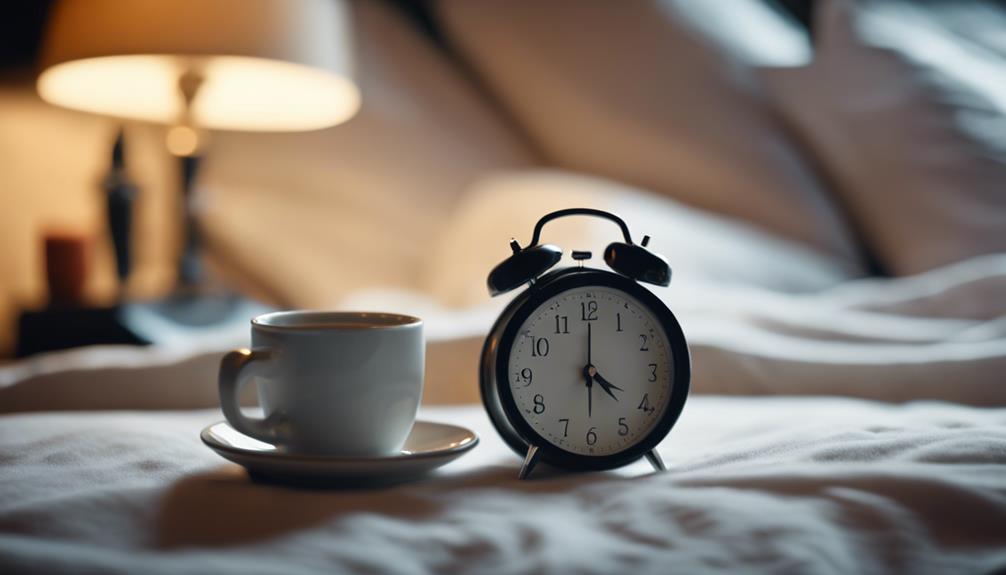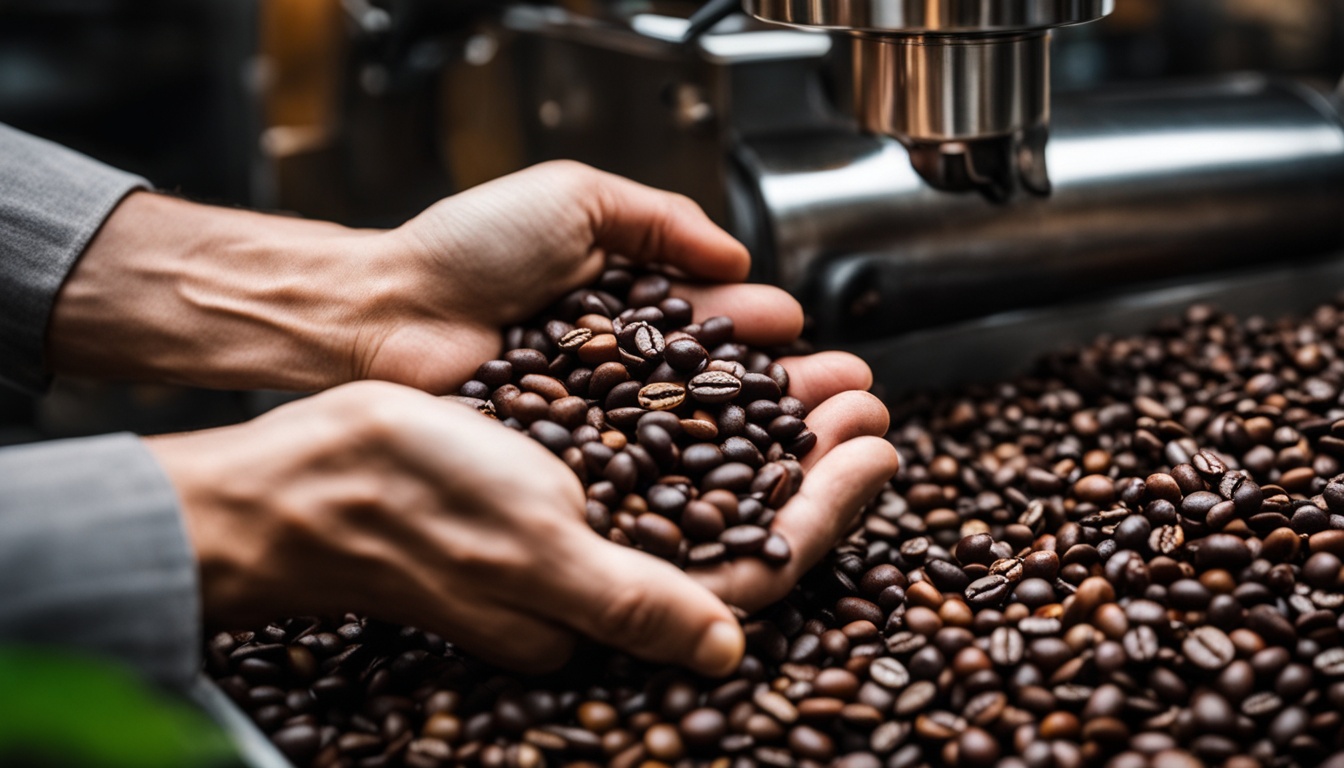Espresso, loaded with caffeine, effectively jumpstarts alertness, battling fatigue and making it a reliable choice for increasing wakefulness. Its caffeine content stimulates your nervous system, spiking heart rate and boosting alertness for up to 6 hours. Genes and metabolism impact how espresso affects your alertness. Enjoy it moderately to banish drowsiness effectively. Caffeine sensitivity and liver function affect how your body processes it. Understand the best times to sip espresso for peak alertness. Start small to avoid jitters, and skip it near bedtime to maintain quality sleep. Managing hydration and sugar intake with espresso enhances your sleep experience subtly hinting at deeper insights ahead.
Key Takeaways
- Espresso's high caffeine content stimulates the nervous system, increasing alertness.
- Caffeine in espresso blocks adenosine receptors, reducing fatigue and combating drowsiness.
- Timing consumption strategically can optimize alertness and productivity.
- Individual caffeine sensitivity and metabolism influence espresso's impact on wakefulness.
- Moderation in espresso consumption can effectively alleviate drowsiness and enhance wakefulness.
Espresso's Impact on Alertness
How does espresso specifically impact your alertness and wakefulness?
Espresso's strong wake-up punch comes from its high caffeine content, packing around 65mg per 1 oz shot. This potent dose of caffeine quickly gets to work in your body, interacting with adenosine receptors to rev up your heart rate and increase alertness.
The effects of espresso can last for a good 4-6 hours, delivering sustained wakefulness to help you power through your day.
Factors like individual caffeine sensitivity and metabolism play a role in how espresso affects your alertness. Taking into account these factors is crucial.
Downing an espresso too close to bedtime can disrupt your sleep quality, so it's best to enjoy your espresso earlier in the day to fully reap its energizing benefits.
Caffeine's Role in Wakefulness

Caffeine plays a pivotal role in maintaining wakefulness by blocking adenosine receptors in your brain, which can help combat drowsiness.
When you consume espresso, the caffeine content stimulates your nervous system, promoting alertness and a temporary energy boost.
Understanding how caffeine interacts with your body can shed light on how espresso affects your ability to stay awake and focused.
Caffeine and Alertness
Blocking adenosine receptors, espresso's caffeine content plays an important role in enhancing alertness and wakefulness. Caffeine, a key component in espresso, works by inhibiting the effects of adenosine, a neurotransmitter that promotes relaxation and sleepiness. By blocking adenosine receptors, caffeine reduces feelings of fatigue and increases alertness.
When you consume a cup of espresso, the caffeine quickly gets to work countering the increased adenosine levels in your brain, helping you combat tiredness and feel more awake.
Moreover, caffeine in espresso paves the way for the release of dopamine and glutamic acid, neurotransmitters that play significant roles in attention and alertness. By keeping adenosine at bay, caffeine ensures that your nerve cells remain active and firing, leading to improved focus and concentration.
The heightened release of dopamine and glutamic acid resulting from espresso consumption further elevates your levels of attention and wakefulness, making it an effective tool to kickstart your day.
Espresso Vs Drowsiness
In your battle against drowsiness, espresso emerges as a potent ally, thanks to its caffeine content that combats fatigue and enhances wakefulness. A 1 oz shot of espresso typically packs around 65mg of caffeine, which can help you stay awake and alert.
Caffeine in espresso works by blocking adenosine receptors in the brain, reducing the feeling of tiredness and increasing your level of alertness. These effects of caffeine can last for 4-6 hours, providing a sustained boost in wakefulness.
Keep in mind that individual factors such as caffeine sensitivity and metabolism can influence how espresso affects your ability to combat drowsiness. By consuming espresso in moderation, you can effectively alleviate drowsiness and improve your overall alertness throughout the day.
Energy Boost Mechanism
When you need a quick energy boost to combat drowsiness, understanding how caffeine operates in espresso can shed light on its role in enhancing wakefulness.
Caffeine in espresso works by blocking adenosine receptors in the brain, which are responsible for promoting sleepiness. By inhibiting these receptors, caffeine prevents adenosine from signaling to the brain that it's time to rest, consequently reducing feelings of fatigue. The first cup of espresso provides a rapid energy boost by increasing alertness through this mechanism.
Moreover, caffeine in espresso paves the way for the release of dopamine and glutamic acid in the brain, enhancing attention, concentration, and overall cognitive function. Nerves continue to function without the usual shutdown signal from adenosine, keeping you awake and focused.
The increased release of dopamine and glutamic acid from consuming espresso further contributes to heightened alertness and improved brain function. This combination of effects makes espresso an effective tool for combating drowsiness and boosting energy levels.
Factors Affecting Wakefulness Duration

Factors influencing how long caffeine keeps you awake include your individual sensitivity to caffeine and the rate at which your body breaks it down. Individuals vary in how they react to caffeine, with some feeling its effects more strongly than others. The body metabolizes caffeine at a rate of about 5 hours for half of it to be broken down, with complete breakdown taking up to 20 hours. This breakdown process can be influenced by factors such as age, weight, and overall health.
When it comes to espresso, the caffeine content can vary depending on the type of coffee beans used and the brewing method. Specialty roasters often offer more consistent caffeine levels in their espresso, ensuring a reliable wakefulness boost. However, it's essential to consume espresso in moderation to prevent potential adverse effects of excessive caffeine intake, such as sleep disturbances, nervousness, palpitations, and stomach problems.
Moderation in Espresso Consumption

Consider starting with gradual adjustments when determining your best espresso intake level. Moderation is important when it comes to espresso consumption, as exceeding recommended limits can lead to negative effects on your health.
Keep in mind the following points to make sure you're consuming espresso responsibly:
- Monitor your caffeine content: Different beans and roast levels can affect the caffeine levels in your espresso.
- Know your tolerance levels: Each person reacts differently to caffeine, so pay attention to how your body responds.
- Stay within official guidelines: It's recommended not to exceed 400mg of caffeine per day, including all sources.
- Pair espresso with food: Consuming espresso with a meal can help manage potential issues with blood sugar control.
Caffeine Breakdown in the Body

When you drink espresso, the caffeine it contains gets absorbed into your bloodstream and reaches your brain.
This process blocks adenosine receptors, which are responsible for making you feel tired.
As a result, this interruption in adenosine's function helps enhance your alertness and combat drowsiness.
Caffeine Absorption Process
The caffeine absorption process initiates in the stomach before reaching peak levels in your bloodstream within 15-45 minutes of consumption. Once absorbed, the liver metabolizes caffeine, breaking it down into compounds that affect your body in various ways. Understanding this breakdown process is essential for managing your caffeine intake effectively.
Here's how it works:
- Stomach Absorption: Caffeine begins its journey in the stomach, where it's absorbed into the bloodstream.
- Peak Levels: Within 15-45 minutes after consumption, caffeine reaches its highest concentration in your bloodstream, leading to its stimulating effects.
- Liver Metabolism: The liver plays a significant role in breaking down caffeine into different compounds that impact your body's functions.
- Elimination Process: Caffeine's half-life is approximately 5 hours, with complete elimination from your system taking up to 20 hours.
Factors like age, genetics, and liver function can influence how quickly your body processes caffeine, affecting its overall impact on your alertness levels.
Impact on Alertness
Caffeine breakdown in the body influences your level of alertness by impacting neurotransmitter activity in the brain. When you consume espresso, the caffeine it contains blocks adenosine receptors, which are responsible for signaling fatigue. This blockage leads to a reduction in the feeling of tiredness, helping you stay alert and awake. The half-life of caffeine, around 5 hours, determines how long its effects on wakefulness last. As adenosine is blocked, levels of dopamine and glutamic acid increase, further enhancing your alertness.
To understand better how caffeine from espresso affects alertness, let's look at the following table:
| Espresso and Alertness | Impact |
|---|---|
| Blocks adenosine receptors | Reduces fatigue |
| Increases dopamine levels | Enhances alertness |
| Influenced by metabolism | Varies alertness level |
| Half-life around 5 hours | Duration of wake-up effect |
| Moderation is key | Maximize benefits |
Individual Sensitivity to Caffeine

Factors such as genetics, age, and metabolism all contribute to how sensitive individuals are to the effects of caffeine. Caffeine sensitivity varies among people, influenced by genetic makeup, how efficiently the body metabolizes caffeine, and overall liver function.
Some individuals may experience heightened stimulating effects from caffeine, while others may be less reactive to its wakefulness-promoting properties. Understanding your own caffeine sensitivity can assist in determining the best amount of espresso needed to achieve the desired level of alertness.
- Genetic factors play an important role in determining caffeine metabolism.
- Liver function can impact how quickly the body processes caffeine.
- Individual reactions to caffeine's stimulating effects vary.
- Personal awareness of caffeine sensitivity aids in managing espresso consumption for wakefulness.
Tolerance Levels and Wakefulness

Understanding your individual tolerance to caffeine plays a crucial role in how awake espresso can make you feel. Tolerance levels vary among individuals, influencing the impact of espresso on wakefulness.
If you have a lower tolerance to caffeine, you may experience a quicker and more pronounced wake-up effect from espresso. This heightened sensitivity to caffeine can enhance your perceived level of wakefulness after consuming espresso.
Additionally, differences in caffeine metabolism from person to person play a major role in the wake-up effect of espresso. By recognizing your personal tolerance levels and how your body processes caffeine, you can better harness the energizing benefits of espresso.
Optimizing your espresso consumption based on your tolerance can help you achieve the desired level of wakefulness without overdoing it on caffeine. Experimenting with different amounts of espresso and monitoring your body's response can aid in finding the perfect balance for enhancing your alertness effectively.
Avoiding Sleep Disturbances

To maintain quality sleep while enjoying espresso, it's important to be mindful of when you consume it, especially in relation to your bedtime. Caffeine, a key component in espresso, can lead to sleep disturbances if consumed too close to bedtime.
Here are some tips to help you avoid such disruptions:
- Limit evening intake: Try to avoid consuming espresso or any caffeinated beverages in the evening to prevent interference with your sleep cycle.
- Understand personal tolerance levels: Each individual metabolizes caffeine differently, so be aware of how espresso affects your personal sleep patterns.
- Consider decaf or herbal alternatives: If you crave a warm drink in the evening, opt for decaffeinated espresso or herbal teas to unwind without the caffeine jolt.
- Stay hydrated and watch sugar intake: Hydrating adequately and avoiding sugary drinks alongside espresso can aid in preventing sleep disturbances, promoting a more restful night's sleep.
Optimizing Wakefulness With Espresso

When seeking to enhance wakefulness with espresso, timing your consumption strategically is key for maximizing its effects on alertness and productivity.
Espresso wake is influenced by the caffeine content in a 1 oz shot, typically around 65mg, providing a sustained wake-up effect lasting 4-6 hours.
To optimize wakefulness, consider your caffeine metabolism and sensitivity, as these factors can affect how espresso impacts your alertness.
It's important to stay within recommended caffeine limits, starting with small amounts to gauge your body's response and prevent overstimulation.
Additionally, avoiding espresso close to bedtime is crucial for maintaining good sleep quality while reaping the benefits of increased wakefulness during the day.
Frequently Asked Questions
Does a Shot of Espresso Wake You Up?
A shot of espresso can indeed wake you up. With around 65mg of caffeine, espresso's stimulant effects block adenosine receptors in your brain, reducing sleepiness and boosting alertness. Factors like caffeine sensitivity, metabolism, and genetics play a role in how effective espresso is at waking you up.
To avoid sleep disruptions, it's best to consume espresso earlier in the day. Understanding your tolerance and practicing moderation are essential for maximizing espresso's wake-up benefits.
Does Espresso Actually Give You Energy?
Yes, espresso does give you energy.
The caffeine in espresso acts as a natural stimulant, blocking adenosine receptors in your brain to reduce fatigue and increase alertness.
When consumed in moderation, espresso can provide a noticeable energy boost by enhancing your mental focus and reducing feelings of sleepiness.
This wake-up effect is primarily due to caffeine absorption into your central nervous system, helping you feel more awake and alert.
How Long Do the Effects of Espresso Last?
Espresso's effects typically last 4-6 hours due to its caffeine content. Factors like age, metabolism, and caffeine sensitivity influence how long it lasts for you.
When you consume espresso impacts how long it keeps you awake. Avoiding it close to bedtime can prevent sleep disturbances.
Moderation in consumption is key for staying alert without affecting your sleep patterns.
How Long Does It Take for Espresso to Give You Energy?
Espresso gives you energy pretty quickly, usually within 10-15 minutes of sipping it. That jolt you feel? It's the high caffeine content doing its thing, zooming into your bloodstream for a rapid wake-up call.
The boost hits its peak around 30-60 minutes after you drink it. Remember though, how fast you feel energized can vary based on your caffeine tolerance and metabolism.
Is Espresso a Reliable Way to Wake Up, According to Experts?
According to experts, espresso is a reliable way to wake up instantly due to its high caffeine content. Many believe that the strong, concentrated brew can provide a quick energy boost, making it a popular choice for those seeking a quick pick-me-up in the morning.
Will Drinking Espresso Instantly Wake Me Up?
Drinking espresso can give you an instant wake-up jolt, thanks to its high caffeine content. The strong, bold flavor of espresso can jolt your senses and provide a quick burst of energy. So, if you need a quick espresso wake up instantly, a shot of espresso might be just what you need.
Conclusion
So, next time you reach for that espresso to wake you up, remember that caffeine's effects vary from person to person.
Moderation is key in avoiding sleep disturbances and optimizing wakefulness.
By understanding how espresso impacts alertness and being mindful of your own caffeine sensitivity, you can make the most of your morning pick-me-up.
Just like a well-crafted shot of espresso, a balanced approach to caffeine consumption can help you start your day on the right foot.









